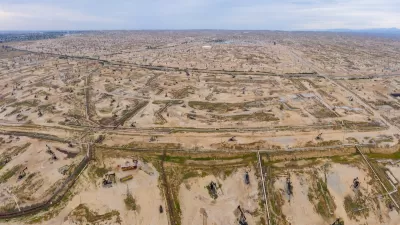According to one study, cities are often wrongly blamed for 75 to 80% of greenhouse gas emissions; the figure is closer to 40%.
"...The paper also highlights how it can be misleading to allocate greenhouse gas emissions to places. For instance, emissions from power stations should be allocated to those that consume the electricity, not the places where the power stations are located. Emissions generated by industries should likewise be allocated to the person consuming the goods the industries produce.
'Consumer demand drives the production of goods and services, and therefore the emission of greenhouse gases,' says [the paper's author, David] Satterthwaite.
'Allocating emissions to consumers rather than producers shows that the problem is not cities but a minority of the world's population with high-consumption lifestyles. A large proportion of these consumers live not in cities but in small towns and rural areas.'"
Thanks to Jon Cecil, AICP
FULL STORY: Don't Blame Cities For Climate Change, See Them As Solutions

Planetizen Federal Action Tracker
A weekly monitor of how Trump’s orders and actions are impacting planners and planning in America.

Maui's Vacation Rental Debate Turns Ugly
Verbal attacks, misinformation campaigns and fistfights plague a high-stakes debate to convert thousands of vacation rentals into long-term housing.

San Francisco Suspends Traffic Calming Amidst Record Deaths
Citing “a challenging fiscal landscape,” the city will cease the program on the heels of 42 traffic deaths, including 24 pedestrians.

Amtrak Rolls Out New Orleans to Alabama “Mardi Gras” Train
The new service will operate morning and evening departures between Mobile and New Orleans.

The Subversive Car-Free Guide to Trump's Great American Road Trip
Car-free ways to access Chicagoland’s best tourist attractions.

San Antonio and Austin are Fusing Into one Massive Megaregion
The region spanning the two central Texas cities is growing fast, posing challenges for local infrastructure and water supplies.
Urban Design for Planners 1: Software Tools
This six-course series explores essential urban design concepts using open source software and equips planners with the tools they need to participate fully in the urban design process.
Planning for Universal Design
Learn the tools for implementing Universal Design in planning regulations.
Heyer Gruel & Associates PA
JM Goldson LLC
Custer County Colorado
City of Camden Redevelopment Agency
City of Astoria
Transportation Research & Education Center (TREC) at Portland State University
Jefferson Parish Government
Camden Redevelopment Agency
City of Claremont





























